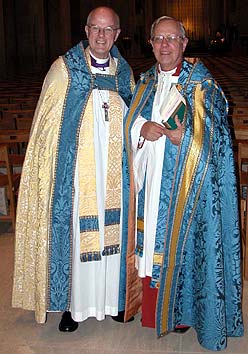| Sections |
| Who's who |
| Adult groups |
| Children |
| Music |
| Music events |
| Function hall |
| Other |
| Links |
| Contact us |
| Sitemap |
The Revd Canon Richard Hanford
(also known as the Vicar of Ewell)
« Back to What we've been doing

In a very low-key announcement in the Weekly Notes of 24 August, the Vicar told us that the Bishop of Guildford had appointed him an Honorary Canon of Guildford Cathedral. This is a well-merited recognition of the Vicar's services to his parish, to the diocese and - through his ten-year membership of the General Synod - to the Church of England more widely. We send him our warmest congratulations.
The term "canon', which at its root means a rule, law or decree of the Church, has developed many subsidiary uses, some of which are very appropriate to the Vicar and are explored briefly below (but some caution may be needed, for example to rebut any suggestion that the Vicar has been "canonized" in the saintly sense!)
Church of England cathedrals are controlled by a chapter of canons, with the Dean at their head. As the Vicar explained, he was a residentiary canon at Guildford Cathedral before he came to Ewell, and as such was a working member of the Cathedral clergy; these clergy are complemented by honorary canons selected from the parochial - and other clergy of the diocese - honorary both because they receive no extra stipend and because it is an honour - a mark of distinction. Residentiary and Honorary Canons form what is sometimes called the Greater Chapter of the cathedral. (The Vicar, as a student of history, would refine the brief summary and perhaps remind us that, in medieval times, some cathedrals were controlled by monks under a prior, and some by canons under a dean; when the monasteries were dissolved, the present more uniform pattern emerged.)
The Vicar is, of course, already an expert in canon law (with a degree to prove it) - that is the law of the church; his role in reforming marriage rules, including banns of marriage, is well-known. "Canon" is also used to describe the (authorised) books which comprise the Bible - the Vicar's learned sermons on the Bible come to mind. The term 'canon' also refers to the key section of the Eucharist - his knowledge and love of the liturgy is patent; he once taught this at the former Chichester Theological College (but St Richard of Chichester is someone else - remember the Vicar has not been canonized!) Finally 'canon' refers to a particular type of musical composition, reminding us that the Vicar is a devotee and supporter of church music and a superb organist.
We now know that the Vicar's installation as an honorary Canon (that is, putting him into his stall in the Cathedral) will take place on Sunday, 12th October at Evensong; but as he is already "Canon Richard" we can all applaud with gusto. Rejoice!
Norman Hale
